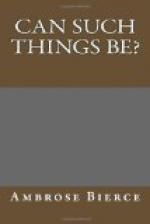THE DEATH OF HALPIN FRAYSER
I
For by death is wrought greater change than hath been shown. Whereas in general the spirit that removed cometh back upon occasion, and is sometimes seen of those in flesh (appearing in the form of the body it bore) yet it hath happened that the veritable body without the spirit hath walked. And it is attested of those encountering who have lived to speak thereon that a lich so raised up hath no natural affection, nor remembrance thereof, but only hate. Also, it is known that some spirits which in life were benign become by death evil altogether.—Hali.
One dark night in midsummer a man waking from a dreamless sleep in a forest lifted his head from the earth, and staring a few moments into the blackness, said: “Catherine Larue.” He said nothing more; no reason was known to him why he should have said so much.
The man was Halpin Frayser. He lived in St. Helena, but where he lives now is uncertain, for he is dead. One who practices sleeping in the woods with nothing under him but the dry leaves and the damp earth, and nothing over him but the branches from which the leaves have fallen and the sky from which the earth has fallen, cannot hope for great longevity, and Frayser had already attained the age of thirty-two. There are persons in this world, millions of persons, and far and away the best persons, who regard that as a very advanced age. They are the children. To those who view the voyage of life from the port of departure the bark that has accomplished any considerable distance appears already in close approach to the farther shore. However, it is not certain that Halpin Frayser came to his death by exposure.
He had been all day in the hills west of the Napa Valley, looking for doves and such small game as was in season. Late in the afternoon it had come on to be cloudy, and he had lost his bearings; and although he had only to go always downhill—everywhere the way to safety when one is lost—the absence of trails had so impeded him that he was overtaken by night while still in the forest. Unable in the darkness to penetrate the thickets of manzanita and other undergrowth, utterly bewildered and overcome with fatigue, he had lain down near the root of a large madrono and fallen into a dreamless sleep. It was hours later, in the very middle of the night, that one of God’s mysterious messengers, gliding ahead of the incalculable host of his companions sweeping westward with the dawn line, pronounced the awakening word in the ear of the sleeper, who sat upright and spoke, he knew not why, a name, he knew not whose.
Halpin Frayser was not much of a philosopher, nor a scientist. The circumstance that, waking from a deep sleep at night in the midst of a forest, he had spoken aloud a name that he had not in memory and hardly had in mind did not arouse an enlightened curiosity to investigate the phenomenon. He thought it odd, and with a little perfunctory shiver, as if in deference to a seasonal presumption that the night was chill, he lay down again and went to sleep. But his sleep was no longer dreamless.




